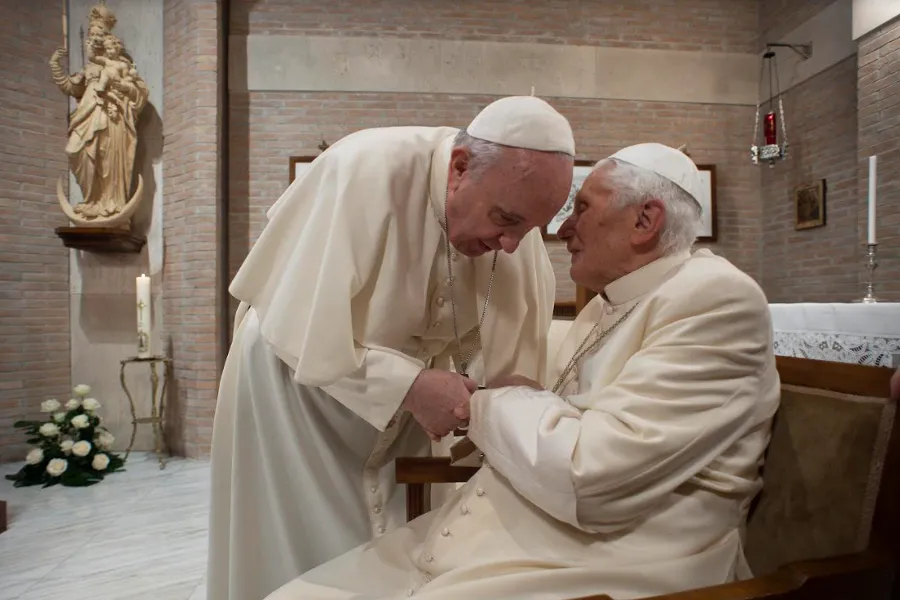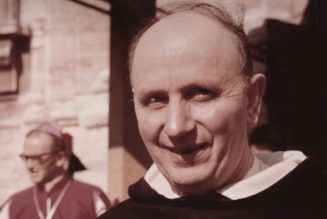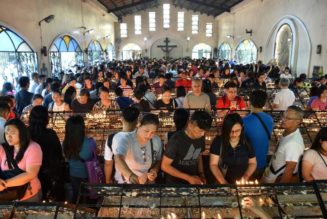VATICAN CITY — Archbishop Georg Gänswein has shared the inside story of how Pope Emeritus Benedict XVI responded to a report criticizing his handling of four abuse cases when he led Germany’s Archdiocese of Munich and Freising.
In an exclusive interview with EWTN’s Vatican Bureau Chief Andreas Thonhauser, Benedict XVI’s personal secretary defended the retired pope’s actions, described his pioneering work in combating clerical abuse despite resistance at the Vatican, and spoke of Pope Francis’ strong personal support for his predecessor. The full interview will air on Feb. 14 at 6:30pm Eastern on a special episode of EWTN’s Vaticano program.
The interview was conducted on Feb. 11, days after Benedict XVI personally requested forgiveness from abuse survivors following the publication of the report covering his tenure as Munich archbishop from 1977 to 1982.
The 94-year-old retired pope said in a letter that his pain was all the greater, as he had “borne great responsibility in the Catholic Church.”
The letter was accompanied by a three-page rebuttal of the report’s criticisms, signed by four advisers of the pope emeritus.
‘A Mistake Was Made’
In the interview, Archbishop Gänswein acknowledged the controversy generated by an 82-page statement submitted on Benedict’s behalf to investigators compiling the study.
One of the four cases highlighted by the report concerned a priest named Father Peter Hullermann, who is accused of abusing at least 23 boys age 8 to 16 between 1973 and 1996.
The statement signed by the retired pope said that he was not present at a meeting in 1980 at which the priest’s transfer from the Diocese of Essen to the Munich Archdiocese was discussed.
But days after the report’s publication by the Munich law firm Westpfahl Spilker Wastl, the pope emeritus acknowledged that he had attended the meeting.
The correction prompted uproar in Germany, with critics of Benedict XVI accusing him of covering up his presence at the meeting and supporters pointing out that his attendance was already a matter of public record.
Archbishop Gänswein explained that the error occurred when the retired pope was reviewing a draft of his statement.
He recalled that Benedict said: “That meeting, the famous one, on Jan. 15, 1980, I don’t remember. But if it says that I was absent, then this absence is proven — or was proven back then — because of a document of the meeting.”
“And that’s where the mistake happened,” the 65-year-old archbishop said.
Archbishop Gänswein said he was “shocked” to learn after the report’s publication that there was evidence showing Benedict had attended the meeting.
“I told Pope Benedict, and he said: ‘We have to say immediately that it was a mistake on our part.’ It was not intentional, so it was not a lie — lies happen on purpose — it was a mistake.”
The archbishop said that Benedict decided to write a personal letter following the report, but asked for it to be accompanied by “an answer to the charges against me, and not only to the charges, but also to the insinuations, based on the file material.”
Pope Francis’ ‘Touching’ Letter
Archbishop Gänswein told EWTN that Pope Francis had offered his support to Benedict XVI as the pope emeritus faced intense criticism.
“He was very clear. He called and assured him of his solidarity, his absolute trust, his brotherly trust, and his prayer. He also said that he cannot understand why they come down so hard on him,” said Archbishop Gänswein, who has lived with Benedict XVI at the Vatican’s Mater Ecclesiae Monastery since the German pope stepped down in 2013.
“When Pope Benedict wrote his letter, he sent it to Pope Francis; before it was published, of course. He thanked him for the phone call and asked him if it was okay.”
“Two days later, a beautiful letter of Pope Francis to Pope Benedict arrived — a letter in which he assured him once again, and with really touching words of his support, his solidarity and his support, telling him that he had his back.”
Archbishop Gänswein said that he could not publish the letter, as it was “confidential and private,” but he was nevertheless allowed to speak about it.
The ‘Father of Transparency’
The archbishop noted that the media reaction to Benedict’s letter varied from country to country, but the response in Germany was marked by negativity.
“I could observe a great, sometimes even immoderate, bias against his person, paired with a no less immoderate ignorance of the facts,” he commented.
“Either you don’t know them or you don’t want to take them seriously because it might not correspond to the narrative that has been created.”
He said that untruths about Benedict were being “kept alive.”
“That is to say, there is this wish to come down hard on him. And that is simply shocking for me,” he said.
After leaving the Munich Archdiocese in 1982, the future pope served as prefect of the Vatican Congregation for the Doctrine of the Faith (CDF). In 2001, Pope John Paul II entrusted the CDF with investigating allegations of clerical abuse worldwide.
Archbishop Gänswein said that Benedict encountered “internal resistance” at the Vatican as he sought to take decisive action against abusers, but was able to overcome it with the Polish Pope’s support.
“He did not only play a decisive role, he was the decisive figure, the decisive man; the one who not only suggested transparency, but also took concrete steps towards transparency. One can say, he is the ‘father of transparency,’ and thus he also managed to convince Pope John Paul II,” he said.
After John Paul II’s death in 2005, Benedict was elected pope. During his almost-eight-year pontificate, he dismissed hundreds of abusers from the clerical state, regularly met abuse survivors, and addressed the abuse crisis in Ireland in a 2010 pastoral letter.
Archbishop Gänswein said: “The man who, in this important question — the whole question of abuse and pedophilia — has suggested and then implemented the decisive instruments to help, whether as a prefect, or as pope, is being accused of something that contradicts 25 years of his work.”
“So, what I perceive again and again, is ignorance on the one hand and an excessive overvaluation of one’s own opinion on the other. And that is something that has nothing to do with truthful coverage.”
“I can only hope that the people who read and have read the letter, people who know Cardinal Ratzinger, Pope Benedict, will not let themselves be influenced or convinced by such biased judgments. That’s my hope.”
The ‘Abuse of Abuse’
Archbishop Gänswein noted that the Munich report’s publication, and the wave of anger it generated, coincided with a crucial meeting of the “Synodal Way,” the controversial multiyear process bringing together Germany’s bishops and laypeople to discuss the way power is exercised in the Church, sexual morality, the priesthood, and the role of women.
At the Feb. 3-5 gathering, participants voted in favor of draft texts calling for the abolition of priestly celibacy, the ordination of women priests, same-sex blessings, and changes to Catholic teaching on homosexuality.
The Synodal Way’s supporters present it as a necessary response to the abuse crisis that has engulfed the German Church, leading to a mass exodus of Catholics. But critics argue that it will lead to schism.
“We can speculate about the extent to which this is connected temporally or causally with what you have mentioned, that is — to name it clearly — the Synodal Way in Germany and other movements,” Archbishop Gänswein told his interviewer.
“But one thing is clear: Certain goals that the Synodal Way is aiming at are something for which the person and the work of Benedict stand in the way.”
“And there is this great, great danger that everything that has to do with pedophilia and abuse is now taken monocausally, so to speak, in order to open this ‘Way’ first and then go down that road. Last week we saw what texts were passed and where this is supposed to lead.”
The archbishop referred to an argument advanced by opponents of the “Synodal Way”: that the process is using the abuse crisis as a pretext to radically reshape the Church. The argument, summed up by the phrase “abuse of abuse,” is rejected by the initiative’s champions.
“It’s always said that the victims of abuse are the focus. And that is absolutely right. There is, though, also the concept of the ‘abuse of abuse.’ And that is precisely the danger that lies herein,” Archbishop Gänswein reflected.
“We must not forget that whenever one tries to manipulate something or someone, they do nothing else than try to reach a goal by hiding it behind another reality, so to speak, until one thinks to have reached the goal.”
‘An Incredible Mass of Information’
The enormous logistical ordeal that the Munich investigation presented the aged Benedict, who will turn 95 in April, is another topic Archbishop Gänswein discussed at length.
“Pope Benedict was asked whether he would be willing to participate in this report. He said: ‘I have nothing to hide. I’ll gladly do it,’” Archbishop Gänswein said.
Doing so entailed reviewing “an incredible mass of information,” he recalled.
The law firm sent Benedict 20 pages of detailed questions, which required a careful review of some 8,000 pages of digitized records in the diocesan archives, Archbishop Gänswein explained. That arduous task fell to a German priest and legal scholar in Rome, Father Stefan Mückl. Unable to “cut and paste” from the records, Father Mückl took extensive notes by hand and managed to complete his exhaustive review in about three weeks, Archbishop Gänswein said.
Digesting the law firm’s final report posed another daunting test for Benedict and his small team of advisers. “The report had 1,983 pages, including Benedict’s statement and the statement of the other cardinals who responded. Imagine that huge amount of paperwork — 2,000 pages — and being expected to answer straightaway! That was simply impossible,” Archbishop Gänswein said.
“A week later, [the current Munich archbishop] Cardinal Marx announced that a press conference would be held in Munich. And Pope Benedict said: ‘I have to read this first. I want to read this first. And I will also ask the staff to read it. And then I will answer.’ You have to admit, to anyone, a man of any age, that this takes time.”
Benedict’s formal response to the law firm, which the pope emeritus proofread, was 82 pages long. “And then there was criticism: ‘It’s too juridical, not Benedict’s voice at all,’ they said. But to legal questions, which are often quite complicated and written in a somewhat wavy language — if I might put it like that — one can only answer using the same language,” Archbishop Gänswein explained.
‘Calm and Full of Trust’
What about the toll this ordeal is having on the pope emeritus’ health? In recent photographs, Benedict XVI appears notably frailer, and he has spoken openly about the end of his life, as he did again in his letter last week.
“Quite soon, I shall find myself before the final judge of my life,” he observed.
He went on to add, however, that “I am nonetheless of good cheer, for I trust firmly that the Lord is not only the just judge, but also the friend and brother who himself has already suffered for my shortcomings, and is thus also my advocate, my ‘Paraclete.’”
Archbishop Gänswein, for his part, confirmed Benedict XVI’s positive disposition, observing that this final paragraph of the pope emeritus’ letter, written “in the presence of God,” he said, “is perhaps the key to it all.”
“This morning we celebrated Mass together, like every day. Then we prayed Lauds and had breakfast. And then he went about his business, and I am here now,” Archbishop Gänswein said.
“He is doing well. The pressure was lifted, thank God, after his letter had been published, together with the fact check. But, I might say, he was always calm and full of trust in God,” Archbishop Gänswein said.
“Of course, it’s one thing to resist pressure and quite another to withstand pressure internally,” he added. “But, thank God, he has managed to do so: He is calm, and, above all, he has never lost his sense of humor.”
Join Our Telegram Group : Salvation & Prosperity









